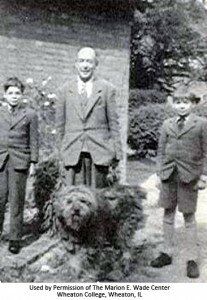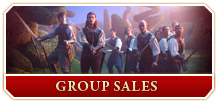I think that in today’s sad and dark world, many people will have difficulty in believing in the real Jack. He was a man who had grown up with the thinking of the 19th century. He believed in honesty, personal responsibility, commitment, duty, courtesy, courage, chivalry and all those great qualities that society in its wisdom dispensed within the 20th century on the grounds that they were somehow outdated, and now needs so desperately to recall and recover. Jack also had come to understand a great deal about humanity and the nature of the species. He was no stranger to suffering: he lost his own mother at the age of nine, and experienced the horrors of one school that was Dickensian to say the least, and others of varying degrees of worth. Jack had fought in the First World War, and lived through the second one, losing friends and colleagues in both. He lived out his eve-of-battle commitment to fellow soldier Paddy Moore, taking care of that man’s family for more than 30 years. Jack had learned to love and to lose, and had suffered the agonies of both. No one could have blamed him had he closed himself off and become (as he is often depicted) an isolated scholar surrounded by cloisters. Instead, released from his burden of caring for Mrs. Moore after her death, he plunged once more into love and pain by marrying my mother, who was already dying at the time. He faced the pain of loving one whom he knew was unlikely to be with him very long, and also took on the responsibility for her sons, my brother and myself. Not an easy task under the best of circumstances, but under those with which he was faced, a task for a veritable hero.
 My mother was an American, and had come to the truth of Christ through reading Jack’s Mere Christianity and his other works. She had written to him with her questions, for all highly intelligent people had questions. And she was delighted when he dealt with her questions and objections in masterful and economic style, and a lively correspondence soon grew up. Mother visited England in 1952, and she, Jack, and Warnie were soon fast friends. Mother was intellectually Jack’s equal, the only one I have ever met, and Jack was delighted when, as they debated and sparred, she would correct him in some minor error of quotation or detail. Mother was slightly more widely read than Jack, for she had read what he had read but also the more modern American writers. She also had travelled further, having been to America and returned to England with her progeny in 1953 when her marriage to my father ended. Jack and she married at her deathbed but the hand of God intervened and she rallied, going into a remission of several years, when they had the happiest years of their lives. It was during this time that the physical courage they both possessed was made evident to me. We were walking up the hill into the woods, my mother carrying her little “garden gun”, which she used to scare pigeons off our vegetables and trespassers out of our woods, when the two of them, some distance ahead of me, were accosted by a young man with a bow and a quiver of arrows. “Excuse me,” said Jack politely, “this is private land and you really shouldn’t be here. Would you please leave?” The young man’s response was to nock an arrow to the string and draw the bow, pointing it at them. Jack stepped in front of my mother to shield her, and stood there for a few seconds until he heard her say, in tones of chilled steel: “God damn it, Jack, get out of my line of fire!” Whereupon Jack stepped swiftly sideways, leaving the young man staring down the barrel of a gun. He took off rapidly. They were brave, and Jack thereafter needed to be, for Mother went on before him, leaving him alone to deal with her absence.
My mother was an American, and had come to the truth of Christ through reading Jack’s Mere Christianity and his other works. She had written to him with her questions, for all highly intelligent people had questions. And she was delighted when he dealt with her questions and objections in masterful and economic style, and a lively correspondence soon grew up. Mother visited England in 1952, and she, Jack, and Warnie were soon fast friends. Mother was intellectually Jack’s equal, the only one I have ever met, and Jack was delighted when, as they debated and sparred, she would correct him in some minor error of quotation or detail. Mother was slightly more widely read than Jack, for she had read what he had read but also the more modern American writers. She also had travelled further, having been to America and returned to England with her progeny in 1953 when her marriage to my father ended. Jack and she married at her deathbed but the hand of God intervened and she rallied, going into a remission of several years, when they had the happiest years of their lives. It was during this time that the physical courage they both possessed was made evident to me. We were walking up the hill into the woods, my mother carrying her little “garden gun”, which she used to scare pigeons off our vegetables and trespassers out of our woods, when the two of them, some distance ahead of me, were accosted by a young man with a bow and a quiver of arrows. “Excuse me,” said Jack politely, “this is private land and you really shouldn’t be here. Would you please leave?” The young man’s response was to nock an arrow to the string and draw the bow, pointing it at them. Jack stepped in front of my mother to shield her, and stood there for a few seconds until he heard her say, in tones of chilled steel: “God damn it, Jack, get out of my line of fire!” Whereupon Jack stepped swiftly sideways, leaving the young man staring down the barrel of a gun. He took off rapidly. They were brave, and Jack thereafter needed to be, for Mother went on before him, leaving him alone to deal with her absence.
In The Chronicles of Narnia: The Voyage of the Dawn Treader, Aslan tells Lucy and Edmund, “This was the very reason why you were brought to Narnia, that by knowing me here for a little, you may know me better [in your world].” Now that some of CS Lewis’ stories have moved into the medium of film (including the upcoming Voyage of the Dawn Treader), he continues to become better known throughout the world, greatly accelerating a trend that has been slowly happening over the 40 years since his death. Like all great men, CS Lewis left behind a legacy; one that will live on in the stories he has written.
Was CS Lewis a great scholar? Undoubtedly. Was he a great writer? No honest scholar today can doubt that for a moment. Was CS Lewis a great teacher? That, I think, is also unquestionable: he taught at Oxford and Cambridge universities, and teaches on today through his books. Was he a great theologian? Many of today’s finest Christian scholars strongly believe so. Although he would never have laid claim to any of those titles, nor perhaps even have accepted them from others, he was all of those things and a great deal more besides.
You see, while CS Lewis was a great scholar, a great writer (in many genres), a great teacher and a great theologian, Jack was a great man.


